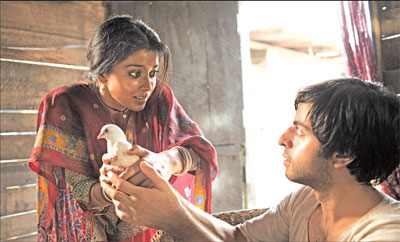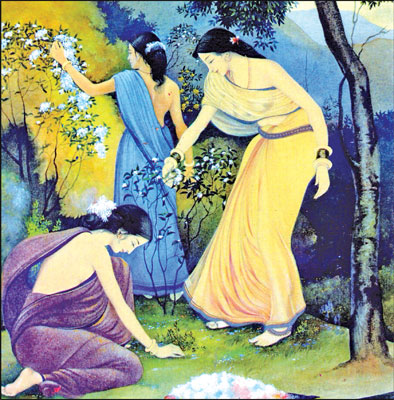|

Role of women in South Asian Literature:
Beyond Barriers
Aditha DISSANAYAKE
Be fearless
Never worry.
As long as you don’t
lift up your heads
men will surround you, guard you
as if they were your eyes.
“Advice to Gentlewomen” by Vijaya Dabbe (Poetess from Kannada)
 In his novel, Midnight’s Children Salman Rushdie begins Saleem’s
story from as way back as 1915. This was the year Saleem’s grandfather,
a doctor named Aadam Aziz, meets his future wife, Naseem. During the
first three years Aadam Aziz treats his patient, she is always covered
by a sheet with a small hole in it. ‘You will kindly specify which
portion of my daughter it is necessary to inspect,” says her father
Ghani. “I will then issue her with my instructions to place the required
segment against that hole which you see there. And so, in this fashion
the thing may be achieved.” In his novel, Midnight’s Children Salman Rushdie begins Saleem’s
story from as way back as 1915. This was the year Saleem’s grandfather,
a doctor named Aadam Aziz, meets his future wife, Naseem. During the
first three years Aadam Aziz treats his patient, she is always covered
by a sheet with a small hole in it. ‘You will kindly specify which
portion of my daughter it is necessary to inspect,” says her father
Ghani. “I will then issue her with my instructions to place the required
segment against that hole which you see there. And so, in this fashion
the thing may be achieved.”
As the years pass, Dr. Aziz finds it difficult to stop thinking of
Naseem. “Waking and sleeping, he could feel in his fingertips the
softness of her ticklish skin or the perfect tiny wrists or the beauty
of the ankles; he could smell her scent of lavender and chameli; he
could hear her voice and her helpless laughter of a little girl; but she
was headless, because he had never seen her face.”
In contrast, Rabindranath Targore begins “Gora” with a description of
how Binoybhushan, a highly educated Bengali young man meets Sucharita,
seeing her face quite clearly, in an encounter that changes his whole
world from then on. Unlike Aziz who never gets a chance to see Naseem’s
face throughout the three years he treats her, Binoy has no restrictions
in looking at Sucharita. Yet, he does not directly do so. Instead, he
watches her reflection in the mirror, and sees a face that, “lowered in
loving anxiety glowed with a tenderness” which to Binoy was a “newly
manifested wonder of nature.”
 |
|
Scene from
Deepa Mehta’s movie: “Midnight’s Children” |
Unlike Rushdie’s Naseem who is trapped in a male chauvinist society
(though with powers of her own when it comes to commanding her family),
Targore’s Sucharita, is a symbol of nature, and as the novel progresses,
slowly but imperceptibly, he transforms this symbol into a form and a
figure, and provides her with a very independent and individual mind.
As Mary Mathew explains in her essay “Rabindranath Targore, Feminism
and Cross Cultural (Re)visions,” using female protagonists in all but
one of his nine novels, Targore describes the heroines’ double
consciousness which results from allegiance to dual forces from the past
and the present. “Their roots on the one hand, are planted in the
predominantly agricultural semi-feudal past, with its rigidly defined
notions of communal ties, famine, chastity, ritual purity and caste
structure” writes Mathew. “While on the other hand, colonial rhetoric
has introduced these compelling rival narratives of female formations
which guarantee greater freedom and collective advantage undercutting
allegiance to any single authoritative model from the past. Caught in
the horns of these two explicit ideologies, Targore’s women reject
regimentation by either and instead opt for a discriminating system
between the best of their heritage and the best of the challenging new.”
Whereas Targore’s protagonists like Binodhini even as they embrace
the new world, are yet celebrations of the historic concepts of
womanhood rooted in the Hindu imagination – they are women who come
through as a race of pristine beings – the opposite is true of the women
in Arundathi Roy’s “The God of Small Things.” In her novel, Roy, though
she herself is a woman, is highly critical of some of the women in the
story. The most evil figure in The “God of Small Things” is an older
woman, the spinster aunt – Baby Kochchamma. She is absolutely
malevolent, almost monstrous in her malevolence, and it is she who
triggers most of the disasters that occur in the novel. Critics have
pointed out that in doing so Roy is showing the ways in which women of
all classes and all generations are positioned by socio-cultural
systems. For Kochchamma too is a victim of this system – her bitterness
stems from certain events in her past.
According to Manmohan Bhatnagar in “Feminist English Literature” Roy
explores the double standards of morality in society regarding men and
woman, and the passive docile role of the wife in a man-woman
relationship i.e Papachchi’s outbursts of violence on Mamachchi from
time to time. At first Ammu feels her only escape from patriarchal
tyranny is through marriage. Yet, when she too becomes a victim of her
husband’s blind rages she returns home and is seen by society as a
“wretched, man-less woman”. Thus Kochchamma describes Ammu as someone
who has “no position at all” in the world.
Undoubtedly From Targore’s Sucharita to Roy’s Ammu to the women in
Kamala Markandaya’s “Nectar in a Sieve” and Meera Mahadevan’s
“Shulamith” who suffer like Ammu, to female characters in the 1980s who
assert themselves and defy marriage and family strictures as seen in
Chitra Fernando’s Three women and Anita Desai’s “In Custody”, the
feminine characters in the South Asian novel have come through three
stages : Tradition, transition and modernity.
 |
|
Scene from
Kalidasa’s Shakuntala painted by Hari Lal Medh |
According to Shoshana M. Landow, “Changing Images of Women in South
Asian Fiction” Chitra Fernando in her collection of short stories
portray women who want their individual worth realized and attempt to
break through the suffering that traditional society offers them whereas
the more recent books, explore an educated woman’s search for identity
and meaning -- in autobiographical form, as in Kamala Das’ “My Story” or
in Sara Suleri’s “Meatless Days.”
As in other facets of modern life, in South Asian literature too the
image of the traditional woman, the Sita- Savitri type, who was expected
mainly to live for others than for herself because “others” controlled
and moulded the social structure, has been thrown off to reveal a woman
on her way to independence and liberation.
The story of Goddess Savitri who is upheld as a prime example of the
lengths to which a wife should go in aiding her husband: following him
anywhere, proving her virtue and remaining under his control, has now
changed and turned into the story of a new, empowering individual
journey of the modern Asian woman.
Thus Janaki Murthy writing under the pseudonym of Vaidehi, returns to
Kalidasa’s fifth century classic, Shakuntala, and retells it, from
Shakuntala’s point of view. In “An Afternoon with Shakuntala” Vaidehi
makes Shakuntala explain her feelings when she first sees Dushyanta: “I
needed him. Why? Not for his genius, not because he is the brightest
jewel of Puru’s dynasty, nor for himself. No, it was for myself that I
wanted him, for my own sake.”
South Asian women, at least in literature, have transcended societal
barriers to reach liberation. In other words, “the white filmy substance
resembling the inner part of the green hood which shelters the grain of
unripe Indian corn” (to quote Mary Shelley) has now ripened.
[email protected]
S.H.O.W. You Care Campaign :
Voice against harassment of women in public spaces
Harassment of women in public spaces has become a major issue in Sri
Lanka. As serious as it is, this issue is being overlooked and is not
given the attention it deserves. How many of us have seen a woman being
uncomfortable and helpless under the harassment of some twisted-minded
person and have looked the other way? How many of us have experienced it
for ourselves -that utter disgusting behavior- and through our own
helplessness have succumbed to that discomfort and allow ourselves to be
harassed without speaking out?
The image of a harasser might strike one’s mind as a seemingly
disturbed, hulking man who visibly can’t sit still with anticipation of
his crime. But no, not always. The calm, very decent looking, apparently
well-educated gentleman sitting next to you might end up trying to lean
into you, to show you his favorite video, or mutter R-rated comments
about you -you know how it is. It could be worse. Why not speak up? Why
not take action to put an end to this growing menace?
 Sri Lanka Unites (SLU) decided to change this, by rallying together a
group of young volunteers and school boys to stand up against this
issue. As a result of this determination, the S.H.O.W You Care (Stop
Harassment Of Women in public spaces) campaign was launched recently at
the Viharamahadevi Open Air Theatre, with an audience of volunteers and
students from leading boys’ schools in Colombo. Sri Lanka Unites (SLU) decided to change this, by rallying together a
group of young volunteers and school boys to stand up against this
issue. As a result of this determination, the S.H.O.W You Care (Stop
Harassment Of Women in public spaces) campaign was launched recently at
the Viharamahadevi Open Air Theatre, with an audience of volunteers and
students from leading boys’ schools in Colombo.
A group of about 200 students and young volunteers, proudly wearing
their S.H.O.W. You Care t-shirts, boarded buses in Colombo apologizing
for being silent about the issue, making a statement against the
harassment of women and the responsibility of men to stand against such
harassment, creating awareness about the law (Sri Lanka Penal Code,
section 345) which punishes harassment of women with a 5 year
imprisonment, and finally pasting stickers and distributing awareness
cards which gave details of how to respond in cases of harassment and
where to lodge a complaint about it.
More than thousand buses were covered during the course of the 5
days, which resulted in the message being received by more than 30,000
commuters. According to Chrisjit Xavier, youth activist -Sri Lanka
Unites, “One of the reasons that we SHOWED we care because this issue
has become normalized due to lack of civil action.”
“Our powers are limited to the very same powers that an average
person has. But through a combined effort, through combined civil
action, we believe we can make a change,” says Xavier further.
The campaign intends to create awareness about the issue, about the
law and about the possible course of action. It also intends to set an
example of men standing up against harassment of women. “The majority of
the students who participated in the campaign were young boys. We wanted
to set an example through this that men should stand up for the rights
of their counterpart,” states Xavier. Not all men are sexual offenders.
It is a minority of men that carry out these activities. But it’s the
silence of the majority that results these actions to go unpunished.
Through the campaign, they attempt to show the authorities that civil
society is concerned about this issue.
At the end of the campaign, a few recommendations to the policy
makers were brought forward.
* Have a few awareness buses with large branding on them
-highlighting Sri Lanka Penal Code, section 345.
* Every bus should have a sticker highlighting a course of action to
be taken when an issue takes place.
* Drivers and conductors should be trained on how to handle a
complaint.
* Incorporate what harassment is into the National education
curriculum, as part of the sexual health component.
* Implement codes of conduct for public transport/public spaces to
minimize the possibility of harassment.
The next step in the S.H.O.W. You Care campaign, the “SHOWDOWN” will
be held on October 20, 2012 at Viharamahadevi Park from 5.30 p.m. to
9.00 p.m.
“At the SHOWDOWN we hope to accomplish 3 things,” says Xavier.
“Firstly, create more awareness about the issue of Harassment in Public
spaces. Secondly, release a policy document with suggestions as to how
we can further combat this issue. This policy would also contain a
pledge by everyone to make Colombo and Sri Lanka as a whole, a much
safer place for women to live in.
We’re hoping to hand over copies of this policy document to policy
makers and concerned authorities for their consideration, so that they
would know that the public wants to put an end to this menace. Thirdly,
we will be symbolically passing the baton to Kandy, where the next
S.H.O.W. You Care campaign will be carried out. We hope for this to grow
into an island wide initiative.”
A woman should have the freedom to live her day to day life
independently. She has the right to be safe, to be protected. The ones
with twisted, disturbing intentions, who try to take her safety, her
dignity away deserves to be brought forward with their intentional
crimes.
Those who deserve to be punished should be punished. We all have a
responsibility to speak out and stand up against harassment of women.
Our voices have power. It’s time we used it. |





